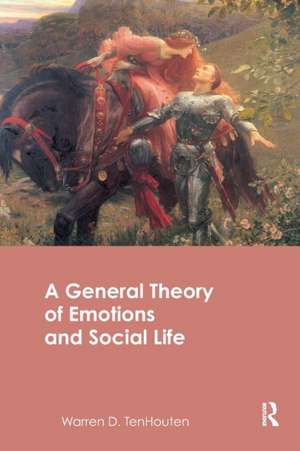A General Theory of Emotions and Social Life: Routledge Advances in Sociology
Autor Warren D. TenHoutenen Limba Engleză Paperback – 4 noi 2008
This neurocognitive sociology of the emotions supersedes the major theoretical perspectives developed in the sociology of emotions by showing primary emotions to be adaptive reactions to fundamental problems of life which have evolved into elementary social relationships and which can predict occurrences of the entire spectrum of primary, complex secondary, and tertiary emotions.
Written by leading social theorist Warren D. TenHouten, this book presents an encyclopaedic classification of the emotions, describing forty-six emotions in detail, and presenting a general multilevel theory of emotions and social life. The scope of coverage of this key work is highly topical and comprehensive, and includes the development of emotions in childhood, symbolic elaboration of complex emotions, emotions management, violence, and cultural and gender differences. While primary emotions have clearly defined valences, this theory shows that complex emotions obey no algebraic law and that all emotions have both creative and destructive potentialities.
| Toate formatele și edițiile | Preț | Express |
|---|---|---|
| Paperback (1) | 418.13 lei 6-8 săpt. | |
| Routledge – 4 noi 2008 | 418.13 lei 6-8 săpt. | |
| Hardback (1) | 1278.88 lei 6-8 săpt. | |
| Taylor & Francis – 28 sep 2006 | 1278.88 lei 6-8 săpt. |
Din seria Routledge Advances in Sociology
-
 Preț: 385.10 lei
Preț: 385.10 lei -
 Preț: 152.38 lei
Preț: 152.38 lei -
 Preț: 309.12 lei
Preț: 309.12 lei - 20%
 Preț: 296.87 lei
Preț: 296.87 lei -
 Preț: 334.09 lei
Preț: 334.09 lei -
 Preț: 204.46 lei
Preț: 204.46 lei - 9%
 Preț: 865.97 lei
Preț: 865.97 lei -
 Preț: 310.81 lei
Preț: 310.81 lei -
 Preț: 326.40 lei
Preț: 326.40 lei -
 Preț: 311.41 lei
Preț: 311.41 lei - 8%
 Preț: 388.97 lei
Preț: 388.97 lei -
 Preț: 288.87 lei
Preț: 288.87 lei -
 Preț: 311.33 lei
Preț: 311.33 lei -
 Preț: 311.41 lei
Preț: 311.41 lei -
 Preț: 303.42 lei
Preț: 303.42 lei -
 Preț: 301.50 lei
Preț: 301.50 lei -
 Preț: 326.63 lei
Preț: 326.63 lei -
 Preț: 152.29 lei
Preț: 152.29 lei -
 Preț: 311.41 lei
Preț: 311.41 lei -
 Preț: 309.94 lei
Preț: 309.94 lei -
 Preț: 316.13 lei
Preț: 316.13 lei -
 Preț: 160.58 lei
Preț: 160.58 lei -
 Preț: 334.09 lei
Preț: 334.09 lei -
 Preț: 309.46 lei
Preț: 309.46 lei -
 Preț: 386.77 lei
Preț: 386.77 lei - 8%
 Preț: 388.91 lei
Preț: 388.91 lei -
 Preț: 310.60 lei
Preț: 310.60 lei -
 Preț: 310.22 lei
Preț: 310.22 lei -
 Preț: 310.51 lei
Preț: 310.51 lei -
 Preț: 283.77 lei
Preț: 283.77 lei -
 Preț: 311.41 lei
Preț: 311.41 lei -
 Preț: 295.09 lei
Preț: 295.09 lei - 8%
 Preț: 383.57 lei
Preț: 383.57 lei - 18%
 Preț: 1111.55 lei
Preț: 1111.55 lei -
 Preț: 445.38 lei
Preț: 445.38 lei - 18%
 Preț: 701.88 lei
Preț: 701.88 lei - 18%
 Preț: 1053.92 lei
Preț: 1053.92 lei - 18%
 Preț: 1002.36 lei
Preț: 1002.36 lei - 18%
 Preț: 1057.89 lei
Preț: 1057.89 lei - 16%
 Preț: 248.31 lei
Preț: 248.31 lei - 18%
 Preț: 1003.30 lei
Preț: 1003.30 lei - 18%
 Preț: 1109.21 lei
Preț: 1109.21 lei - 18%
 Preț: 997.11 lei
Preț: 997.11 lei - 18%
 Preț: 1061.22 lei
Preț: 1061.22 lei - 18%
 Preț: 1058.06 lei
Preț: 1058.06 lei - 18%
 Preț: 1002.36 lei
Preț: 1002.36 lei - 18%
 Preț: 1113.12 lei
Preț: 1113.12 lei
Preț: 418.13 lei
Nou
Puncte Express: 627
Preț estimativ în valută:
80.01€ • 83.77$ • 66.36£
80.01€ • 83.77$ • 66.36£
Carte tipărită la comandă
Livrare economică 10-24 aprilie
Preluare comenzi: 021 569.72.76
Specificații
ISBN-13: 9780415482721
ISBN-10: 0415482720
Pagini: 324
Ilustrații: 13 b/w images, 9 tables, 3 halftones and 10 line drawings
Dimensiuni: 156 x 234 x 20 mm
Greutate: 0.5 kg
Ediția:1
Editura: Routledge
Colecția Routledge
Seria Routledge Advances in Sociology
Locul publicării:Oxford, United Kingdom
ISBN-10: 0415482720
Pagini: 324
Ilustrații: 13 b/w images, 9 tables, 3 halftones and 10 line drawings
Dimensiuni: 156 x 234 x 20 mm
Greutate: 0.5 kg
Ediția:1
Editura: Routledge
Colecția Routledge
Seria Routledge Advances in Sociology
Locul publicării:Oxford, United Kingdom
Public țintă
Postgraduate and UndergraduateCuprins
1. Introduction 2. From Darwin to Psychoevolutionary Theories of Primary and Secondary Emotions 3. The Two Pairs of Opposite Primary Emotions: Acceptance and Disgust, Joy and Sadness, Anger and Fear, Anticipation and Surprise 4. Secondary Emotions: The Four Pairs of Opposite Primary Dyads: Love and Misery, Pride and Embarrassment, Aggressiveness and Alarm, Curiosity and Cynicism 5. Secondary Emotions, Continued: The Four Pairs of Half-Opposite Secondary Dyads: Dominance and Submissiveness, Optimism and Pessimism, Delight and Disappointment, Repugnance and Contempt 6. Secondary Emotions, Continued: The Eight Tertiary Dyads: Resourcefulness and Shock, Morbidness and Resignation, Sullenness and Guilt, Anxiety and Outrage 7. Secondary Emotions, Continued: The Four Antithetical, Quaternary Dyads: Ambivalence, Catharsis, Frozenness, Confusion 8. The Sociorelational Approach to the Emotions: Four Elementary Forms of Sociality 9. Affect-Spectrum Theory: The Emotions of Rationality and of Intimacy 10. Affect-Spectrum Theory, Continued: The Emotions Linking Informal Community and Formal Society: A Typology of Four Character Structures 11. Social Identity and Social Control: Pride and Embarrassment, Pridefulness and Shame 12. Socialization and the Emotions: From Alexithymia to Symbolic Elaboration and Creativity 13. The Development of Tertiary Emotions: Jealousy, Envy, Ambition, Confidence, and Hope 14. Emotions, Violence, and the Self 15. A Partial Empirical Test of Affect-Spectrum Theory 16. Discussion
Notă biografică
Warren D. TenHouten, UCLA Professor of Sociology, has pioneered the interdisciplinary perspective of neurocognitive sociology. In Time and Society (2005), he presented a general theory of culture and time consciousness. Here, affect-spectrum theory classifies the primary, secondary and tertiary emotions and links each to specific, elementary social relationships.
Descriere
The scope of coverage of this key work is highly topical and comprehensive, and includes the development of emotions in childhood, symbolic elaboration of complex emotions, emotions management, violence, and cultural and gender differences.




























